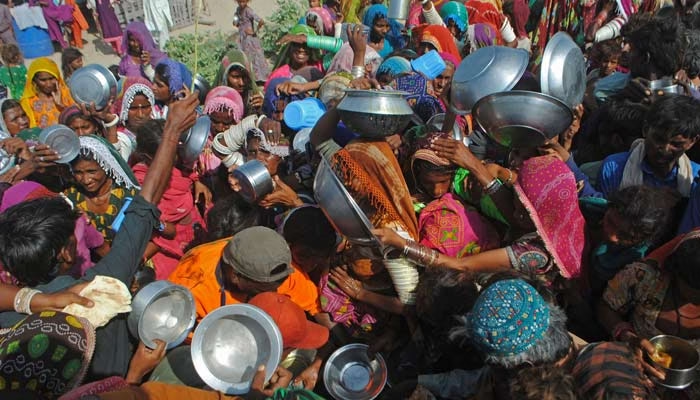A stark warning was issued during a recent symposium on Climate Change, Agriculture, Human Nutrition, and Development in Pakistan, highlighting the looming threat of food insecurity for nearly half of Pakistan’s population by 2030. This two-day event, hosted by the Institute for Global Health and Development (IGHD) in collaboration with the Sustainable Development Solutions Network Pakistan (SDSN), brought together local and international experts to discuss the intersecting impacts of climate change, agriculture, and public health.
Climate Crisis Threatens Food Security
Professor Dr. Zulfiqar Bhutta, founding director of IGHD at Agha Khan University (AKU), emphasized the severe challenges posed by Pakistan’s dependence on the Indus River system, which supports 90% of its agriculture. With glacial melting and erratic rainfall patterns increasing due to climate change, Pakistan faces an unprecedented risk of food shortages. He also cited alarming evidence of humanity breaching six of nine planetary boundaries, including climate and biodiversity limits, pushing global systems into a precarious state, as noted by Prof. Sir Andrew Haines from the London School of Hygiene and Tropical Medicine.
Malnutrition and Gender Inequity: A Dual Challenge
The symposium underscored how climate change amplifies malnutrition and gender inequities. Women, comprising 40% to 60% of Pakistan’s agricultural workforce, remain marginalized in decision-making despite bearing the brunt of food insecurity. Experts highlighted the widespread prevalence of malnutrition and micronutrient deficiencies, urging immediate action to mitigate these health crises.
Dr. Haris Gazdar of the Collective for Social Science Research shed light on the disproportionate burden placed on rural women due to food insecurity, particularly as prolonged heat exposure and resource scarcity exacerbate their vulnerabilities.
Innovative and Collaborative Solutions
Several speakers stressed the need for innovative and inclusive strategies to address these multidimensional issues. Jawed Sibghatullah Mahar, Sindh’s Planning and Development Secretary, emphasized that climate change demands collaborative efforts and proactive policymaking. He called for utilizing platforms like the symposium to bridge research and implementation gaps.
Dr. Tania Bubela, AKU provost, echoed the importance of cross-disciplinary collaboration, describing climate change as a crisis requiring partnerships across all sectors. Dean Dr. Adil Haider reiterated AKU’s commitment to connecting academic research with practical solutions to bolster resilience and sustainable development.
Building Resilience Through Research and Innovation
The symposium’s inaugural session included an announcement from Dr. Mukhtar Ahmed, chairman of the Higher Education Commission, about raising Rs100 million for a national platform dedicated to tackling climate challenges. This initiative, led by Dr. Bhutta, aims to unite experts in health, agriculture, food security, and nutrition to work cohesively rather than in isolation.
Technical sessions featured actionable solutions to mitigate climate impacts. Dr. Abid Suleri of the Sustainable Development Policy Institute (SDPI) presented cost-effective investments needed for resilience. Dr. Ghulam Muhammad Ali, chairman of the Pakistan Agriculture Research Council, discussed using biotechnology to enhance wheat and rice production.
Dr. Mehreen Mujtaba from the Ministry of Health addressed how nutrition policies must adapt to worsening climate conditions. Meanwhile, Dr. Jai K Das from AKU highlighted the disproportionate effects of heat exposure on women and children in rural regions.
Leveraging Nature-Based and Technology-Driven Strategies
Panel discussions called for leveraging nature-based solutions and well-designed mitigation strategies to enhance resilience. Participants, including Tatyana Al-Kour and Dr. Suleri, emphasized the role of nature-based interventions in reducing risks while improving food security, health, and nutrition.
The symposium concluded with Dr. Bhutta’s call for a paradigm shift from reactive to proactive strategies. He advocated evidence-based approaches to address the complex challenges of climate change, food security, and public health.
The Way Forward
Commitments were made to foster interdisciplinary research and actionable solutions. Dr. Lynette Neufeld from the Food and Agriculture Organisation highlighted how low- and middle-income countries like Pakistan face compounded challenges due to climate change-induced malnutrition. Speakers stressed that addressing these crises requires a united effort across academia, government, and the private sector.
The symposium’s discussions underscored the urgency of addressing Pakistan’s food security crisis, which is being driven by climate change. Innovative policies, gender-inclusive strategies, and the integration of scientific research into decision-making are critical to ensuring a sustainable and resilient future for Pakistan.



